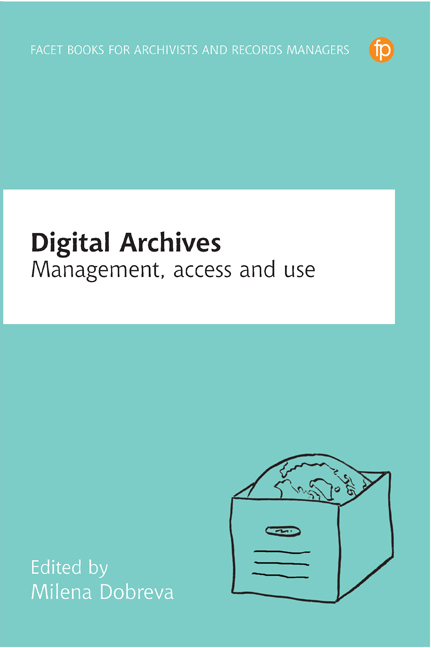Book contents
- Frontmatter
- Dedication
- Contents
- List of Figures and Tables
- Abbreviations
- Foreword
- Preface: Digital archives: management, use and access participatory approaches in archives
- Acknowledgements
- Notes on contributors
- PART I DRIVERS FOR MODERN DIGITAL ARCHIVES
- 1 Digital humanities and documentary mediations in the digital age
- 2 Managing turbulence
- 3 The political economy of digital cultural preservation
- 4 Legal issues surrounding digital archiving
- 5 Scientific information policies in the European context
- 6 Access to digital archives: studying users' expectations and behaviours
- PART II CASE STUDIES
- Afterword
- Index
3 - The political economy of digital cultural preservation
from PART I - DRIVERS FOR MODERN DIGITAL ARCHIVES
Published online by Cambridge University Press: 02 October 2019
- Frontmatter
- Dedication
- Contents
- List of Figures and Tables
- Abbreviations
- Foreword
- Preface: Digital archives: management, use and access participatory approaches in archives
- Acknowledgements
- Notes on contributors
- PART I DRIVERS FOR MODERN DIGITAL ARCHIVES
- 1 Digital humanities and documentary mediations in the digital age
- 2 Managing turbulence
- 3 The political economy of digital cultural preservation
- 4 Legal issues surrounding digital archiving
- 5 Scientific information policies in the European context
- 6 Access to digital archives: studying users' expectations and behaviours
- PART II CASE STUDIES
- Afterword
- Index
Summary
Introduction
Digitisation and distributed communication platforms are responsible for radical transformations in the social conditions of historical truthfulness, social and collective memory institutions, cultural preservation and cultural retrieval practices, as well as many other fundamental changes. For example, one can hardly compare traditional collections of authentic art works, exhibitions and hard copy catalogues with digital images collections of non-profit initiatives such as Artstor Digital Library (www.artstor.org/), commercial images agencies such as Getty Images (www.gettyimages.com/ creativeimages) and online photo management and sharing applications such as Flickr.com (www.flickr.com/).
Similarly, one cannot compare traditional celluloid and video archives of television stations with online archives of public broadcasters, video-web-sharing sites such as YouTube.com (www. youtube.com/), content that is available through social networking sites such as Facebook.com and MySpace.com, and personal archiving through peer-to-peer file-sharing networks. Google's Library Project has hardly any resemblance with New York's central public library. The Internet Archive (www.archive.org/) reflects and constructs social memories and (documented) fragments of the past that are notably different from those of the History Channel (www.history.com/), a famous television station offering programming on historical events and people. And – overall – wars, disasters, political events, public affairs, popular culture, high culture, personal items and many other fractions of people's experiences, encounters and lives seem utterly different when they are narrated, contextualised, documented, filtered, preserved and then made accessible via the web.
These are not merely changes in the scope, scale, diversity and attributes of the institutions that are now taking an active role in cultural preservation activities. These are also transformations in the political economy of historical truthfulness – the allocation of resources and powers, economic, technological and legal, which are responsible for shaping landscapes of history and reflections of the past.
Artstor Digital Library is a non-profit initiative, originally founded by the Andrew W. Mellon Foundation, with a mission to create and provide digital images and related materials for scholarly and educational use. Artstor's digital images collection includes over 500,000 images (artefacts) of original art works (most of them tangible) and it is based on partnerships of royaltyfree non-exclusive licences with major museums and other cultural institutions (most of them are also subscribers of Artstor).
- Type
- Chapter
- Information
- Digital ArchivesManagement, use and access, pp. 39 - 72Publisher: FacetPrint publication year: 2018



